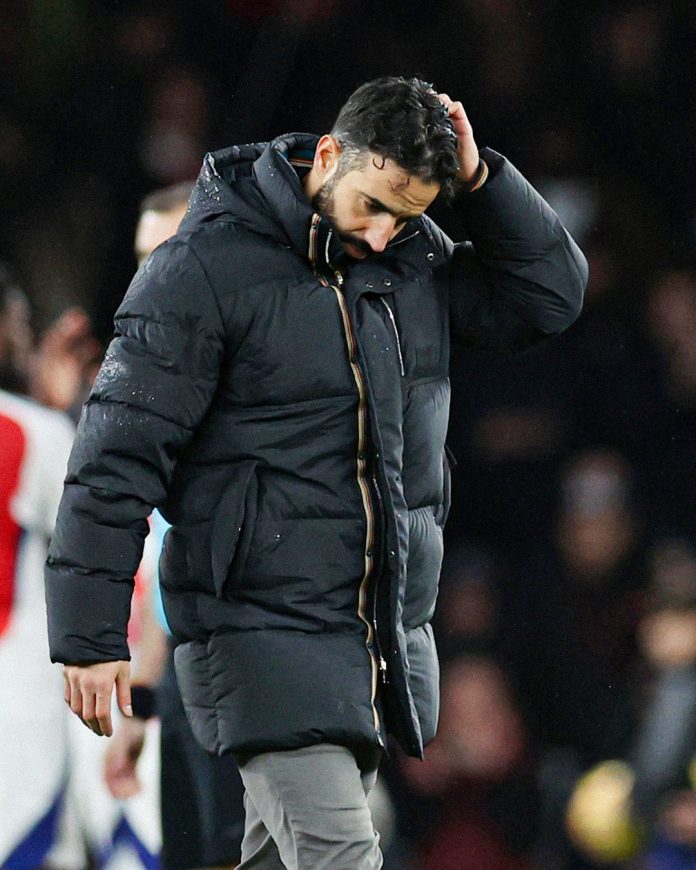Manchester United suffered a 2-0 defeat to Arsenal at the Emirates Stadium on Wednesday night, marking Ruben Amorim’s first Premier League loss since taking charge. Despite a resolute defensive effort for much of the match, United’s Achilles’ heel—set-pieces—proved their undoing.
The defeat underscores the challenges Amorim faces in implementing his philosophy at Manchester United, especially when it comes to fine margins like defending dead-ball situations. Arsenal’s goals, both stemming from expertly executed corner routines, highlighted a glaring vulnerability United must urgently address.
Ruben Amorim, reflecting on the loss, was candid in his assessment. “The set-pieces changed the game,” he admitted in his post-match interview. “We could have been more aggressive towards the Arsenal box. Until the set-pieces, the game didn’t have too many opportunities for both sides.”
Arsenal, known for their tactical ingenuity under Mikel Arteta, capitalized on United’s defensive lapses from corners. While United held their own during open play, the inability to match Arsenal’s physicality and organization in set-piece situations proved decisive.
The first goal saw Arsenal overload the penalty area, leaving United’s defense scrambling. Minutes later, a similar routine led to their second, with Mikel Merino coming close to adding a third in an almost identical fashion. For United, these moments highlighted a lack of preparation and composure in dealing with high-pressure situations.
Opportunities Missed at the Other End
It wasn’t just in defense where United faltered. Despite limited chances, the visitors had their moments, particularly through Matthijs de Ligt. The Dutch defender came agonizingly close to scoring, his powerful header denied by an outstanding save from David Raya.
Speaking to MUTV, De Ligt acknowledged the team’s shortcomings. “In the defensive phase, the amount of chances we conceded without the set-plays [was good]. But in general, we have to—and we will—offensively improve,” he stated.
De Ligt’s comments highlight another concern for Amorim’s United: the lack of cutting-edge in the final third. The team’s inability to capitalize on set-piece opportunities contrasts starkly with Arsenal’s clinical execution, illustrating the fine margins that define high-stakes Premier League encounters.
ALSO READ: Arsenal Ease Past Manchester United with Convincing 2-0 to Close Gap on Premier League Leaders Liverpool
Amorim’s tenure at Old Trafford is still in its infancy, with just four games under his belt. The Portuguese manager has shown glimpses of promise, but his new system is clearly a work in progress. Transitioning to a more possession-based, high-pressing style requires time, and the players are still adapting to his tactical demands.
“We’re still quite early with the new coach, but there are positives,” De Ligt admitted. “We’re on the road to improve as a team… Everybody has to improve a lot and get used to the new system, but you can see certain things that are improving.”
This pragmatic outlook resonates with the realities of a mid-season managerial change. Amorim’s focus on long-term development may not yield immediate results, but the foundations for future success are beginning to take shape. Patience, however, is a rare commodity in modern football, particularly at a club with Manchester United’s expectations.
What Needs to Change?
For Manchester United to compete at the highest level, significant improvements are needed in several areas:
- Set-Piece Defending: The defensive unit must be better organized and more aggressive in aerial duels. Teams like Arsenal exploit weaknesses ruthlessly, and United cannot afford similar lapses in upcoming fixtures.
- Offensive Cohesion: While the defensive structure is solidifying, the attack still lacks fluidity. Players need to build greater understanding and execute Amorim’s ideas with precision.
- Consistency: Four games into Amorim’s reign, consistency remains elusive. Building momentum requires not only tactical adjustments but also mental resilience—qualities that have been lacking in recent performances.
Positives Amid the Disappointment
Despite the loss, there were glimpses of progress under Amorim. The team looked composed in possession during large spells of the game, and their defensive shape in open play frustrated Arsenal’s dynamic attackers. Players like Casemiro and Bruno Fernandes showed leadership, while De Ligt’s performance highlighted his value as a defensive lynchpin.
The manager’s post-match comments also reflected a clear understanding of the issues. His emphasis on improvement rather than excuses is a promising sign for fans eager to see United return to the summit of English football.
Looking Ahead
Manchester United’s journey under Ruben Amorim is far from over. The defeat to Arsenal is a stark reminder of the challenges ahead, but it also offers valuable lessons. Addressing the weaknesses exposed at the Emirates could serve as a turning point in their campaign.
As Amorim himself pointed out, “We have to manage to defend [set-pieces] and we already know we have to be better.” That acknowledgment, combined with the team’s willingness to adapt and improve, bodes well for the future.




